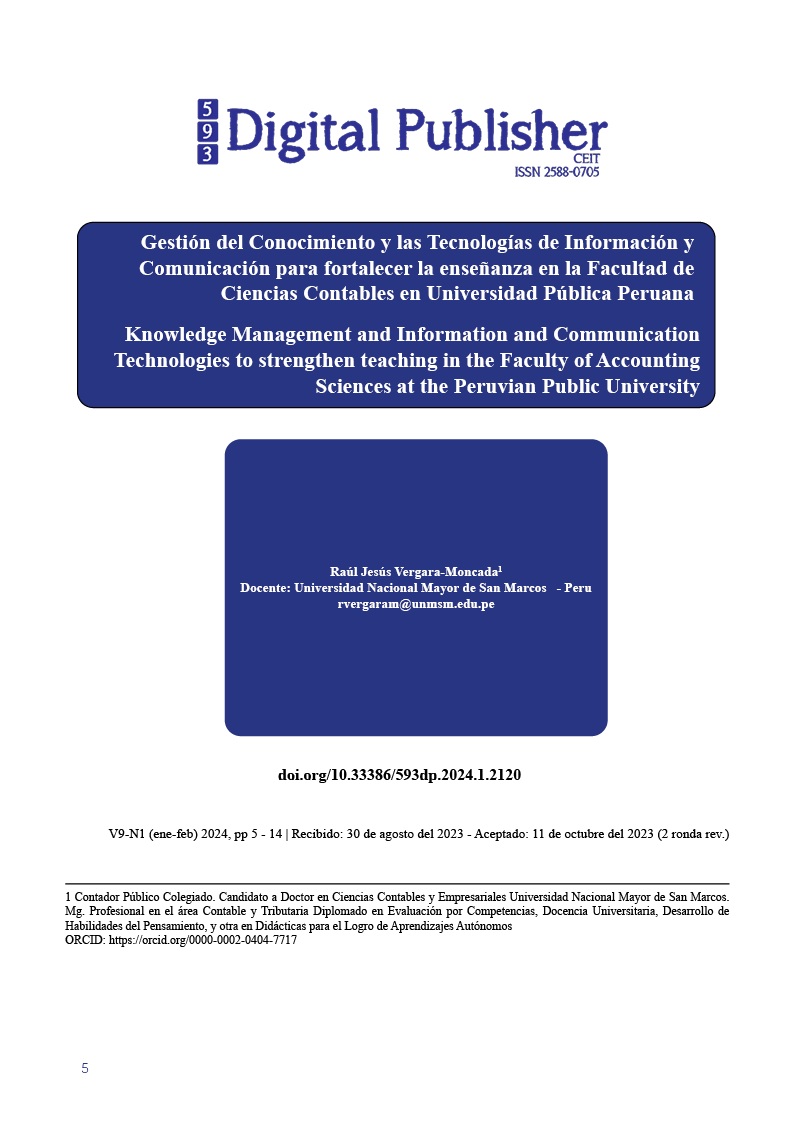Knowledge Management and Information and Communication Technologies to Strengthen Teaching in the Faculty of Accounting Sciences at the Peruvian Public University
Main Article Content
Abstract
The objective of this research study is to determine how the Knowledge Management Model affects Information and Communication Technology to strengthen teaching at the Faculty of Accounting Sciences at a Peruvian Public University. Regarding the problematic situation, it is necessary to strengthen the teacher's digital skills according to a survey carried out at a Public University in Peru. Regarding the Methodology, it was quantitative, descriptive, explanatory, transversal and non-experimental in design where techniques and instruments were applied that helped collect information using Google Forms and the SPSS statistical software. As a result, it was obtained that 45.76% totally agree and 44.07% agree with the knowledge management model, 6.78% neither agree nor disagree, 1.69% disagree and 1 .69% totally disagree with the knowledge management model. It was concluded that the Knowledge Management Model affects Information and Communication Technology to strengthen teaching.
Downloads
Article Details

This work is licensed under a Creative Commons Attribution-NonCommercial-ShareAlike 4.0 International License.
1. Derechos de autor
Las obras que se publican en 593 Digital Publisher CEIT están sujetas a los siguientes términos:
1.1. 593 Digital Publisher CEIT, conserva los derechos patrimoniales (copyright) de las obras publicadas, favorece y permite la reutilización de las mismas bajo la licencia Licencia Creative Commons 4.0 de Reconocimiento-NoComercial-CompartirIgual 4.0, por lo cual se pueden copiar, usar, difundir, transmitir y exponer públicamente, siempre que:
1.1.a. Se cite la autoría y fuente original de su publicación (revista, editorial, URL).
1.1.b. No se usen para fines comerciales u onerosos.
1.1.c. Se mencione la existencia y especificaciones de esta licencia de uso.
References
Aguilera A. (2010). La gestión del conocimiento organizacional. Doi: 10.13140/rg.2.2.28487.29600 https://www.academia.edu/es/30819149/la_gesti%c3%93n_del_conocimiento_organizacionaAlvarez M.I., Zarrabeitia B.I., Ruíz de Arbulú L.P., & Díaz de Basurto U.P. (2010). La empresa basada en conocimiento. Modelo maestro-aprendiz para la transmisión generacional del conocimiento. 4th International Conference on Industrial Engineering and Industrial Management, 820. chrome-extension://efaidnbmnnnibpcajpcglclefindmkaj/https://adingores.sserver.es/congresos/web/uploads/cio/cio2010/knowledge_management//820-827.pdf
Al-Emran, M., V. Mezhuyev, A. Kamaludin y K. Shaalan (2018) The impact of knowledge management processes on information systems: A systematic review, International Journal of Information Management, (43), 173-187 https://www.sciencedirect.com/science/article/abs/pii/s0268401217308186
Arispe, C., Yangali,J., Guerrero, M., Rivera, O., Acuña, L., Arellano, C. (2020). La Investigación Científica. Universidad Internacional del Ecuador. Primera edición. (consultado 03 octubre 2023) disponible en: https://repositorio.uide.edu.ec/handle/37000/4310
Bueno, E. (1998). Modelo de dirección estratégica por competencia: el capital intangible. Recuperado el 18 de enero de 2022, de http://bvs.sld.cu/revistas/aci/ vol13_6_05/aci060605.htm
Casado, J. M. (2020). Más allá de la gestión tradicional del conocimiento. 2.C Consulting. https://www.dosc.es/2020/01/30/mas-alla-de-la- gestion-tradicional-del-conocimiento/
Colomo-Palacios, R., E. Fernandes, P. Soto-Acosta y X. Larrucea. (2018). A case analysis of enabling continuous software deployment through knowledge management, International Journal of Information Management (40), 186-189 https://www.semanticscholar.org/paper/A-case-analysis-of-enabling-continuous-software-Palacios-Fernandes/bacf1c3ede319717f4dada1c7093af80655fe2d4
Cruz, C. L. R. (n.d.). Meta-análisis sobre la determinación de la estructura de capital en empresas colombianas. Bdigital.unal.edu.co. Retrieved from http://www.bdigital.unal.edu.co/48546/
Cuadrado-Barreto, G. (2020). Gestión del conocimiento en la universidad: cuestionario para la evaluación institucional. Revista Iberoamericana de Educación Superior, 11(30), 201–218. https://doi.org/10.22201/ iisue.20072872e.2020.30.596 https://dialnet.unirioja.es/servlet/articulo?codigo=8866451
Davenport TH y Prusak L (2000) Conocimiento práctico: cómo las organizaciones gestionan lo que saben. (Publicado originalmente en 1998). Nueva edición del prefacio, Harvard Business School Press, Boston. https://www.researchgate.net/publication/229099904_Working_Knowledge_How_Organizations_Manage_What_They_Know
García-Álvarez, M. T. (2013). El rol de las tecnologías de la información y comunicación en la gestión del conocimiento: un desafío estratégico en el nuevo contexto empresarial; ISSN: 1315-9518, Revista de Ciencias Sociales (Ve), 19(2), 322-333. https://doaj.org/article/43b86ba3dae24544ba410ebe65944a5e
Gaviria-Marin, M., Merigó, J. M., y Baier-Fuentes, H. (2019). Knowledge management: A global examination based on bibliometric analysis. Technological Forecasting and Social Change, 140, 194-220. https://doi.org/10.1016/j.techfore.2018.07.006
Gonzalvez, M. A. A., Castañeda, O. A., y Ibarra, A. R. (2014). The management and construction of knowledge as an innovation strategy for collaborative learning through the use and creation of learning communities and networks. International Journal of Knowledge Management, 10(4), 38-49. https://doi.org/10.4018/ijkm.2014100103
Hakiman, H., Munadi, M., y Ernawati, F. (2019). Design of knowledge management implementation in Islamic universities. Humanities & Social Sciences Reviews, 7(1), 266-277. https://doi.org/10.18510/hssr.2019.7131
Herrera, C. (2015) Modelo de Gestión del Conocimiento en el Área de Atención de Usuarios De un Organismo Público Especializado [Tesis] Pontificia Universidad Católica del Perú Escuela de Posgrado
https://tesis.pucp.edu.pe/repositorio/handle/20.500.12404/7163
Inche, J. (2010). Modelo Dinámico de Gestión del Conocimiento basado en el Aprendizaje Organizacional en una Institución Educativa en el Perú. [Tesis para optar el grado de Doctor en Ciencias Administrativas]. UNMSM Unidad de Posgrado.
chrome-extension://efaidnbmnnnibpcajpcglclefindmkaj/https://cybertesis.unmsm.edu.pe/bitstream/handle/20.500.12672/1139/Inche_mj.pdf?sequence=1
Kriscautzky, L. M. (2019). ¿Cómo y por qué nos formamos los docentes en el uso de tecnología? Revista Digital Universitaria, 3 https://www.revista.unam.mx/2019v20n6/como-y-por-que-nos-formamos-los-docentes-en-el-uso-de-tecnologia/.
Martins, V. W. B., Rampasso, I. S., Anholon, R., Quelhas, O. L. G., y Fhilo, L. (2019).
Knowledge management in the context of sustainability: Literature review and opportunities for future research. Journal of Cleaner Production, 229, 489-500. https://doi.org/10.1016/j.jclepro.2019.04.354
Marulanda, C. E., Valencia, F. J. y Marín, P. F.(2019). Principales Obstáculos para la Transferencia de Conocimiento en los Centros e Institutos de Investigación del Triángulo del Café en Colombia, doi: http://dx.doi.org/10.4067/S0718-07642019000300039; Información Tecnológica, 30 (3)
Michelino, F., E. Lamberti y otros dos autores (2015). Open models for innovation: an accounting-based perspective, doi: 10.1504/IJTM.2015.068778; International Journal of Technology Management, 68(1-2), 99-121 https://www.inderscience.com/offers.php?id=68778
Nonaka, I., & Takeuchi, H. (1995). The knowledge-creating company how japanese comapnies create the dynamics of innovation. New York etc.: Oxford University Press. https://books.google.com.pe/books?id=B-qxrPaU1-MC&printsec=frontcover&hl=es#v=onepage&q&f=false
Osorio, N. M. (2003). El capital intelectual en la gestión del conocimiento. Obtenido de http://eprints.rclis.org/5038/1/capital.pdf
Parra, A., Serrano, R., y Vargas, B. (2021). Impacto de la gestión del conocimiento en la formación del ingeniero agronomo. Revista Conrado, 17(82), 142–151. https://www.researchgate.net/publication/360518455_Impacto_de_la_gestion_del_conocimiento_en_la_formacion_del_Ingeniero_Agronomo
Pérez-Montoro, M. (2016). Knowledge management: Origins and evolution. Profesional de La Informacion, 25(4), 526–534. https://doi. org/http://dx.doi.org/10.3145/epi.2016.jul.02
Prendes, P. (2017). Personal learning environments in future professional: nor natives or residentes, just survivors. International Journal of Information and Education Technology, 7(3), p. 172-178.
Puspita, M., Rahmatunnisa, M., Sumaryana, A., y Kristiadi, J. B. (2018). Ensuring service quality in education for Indonesia’s sustainable education. Journal of Social Studies Education Research, 9(4), 65-81. http://jsser.org/index.php/jsser/article/view/338/330
Riascos-Erazo, S. C., García-Domínguez, A. J., y Aguilera-Castro, A. (2021). Gestión del conocimiento en el sector industrial. Revista Venezolana de Gerencia, 26(5 Edición Especial), 632–649. https://doi.org/10.52080/rvgluz.26. e5.40
Ricardo, M., y Pérez, M. (2019). Reflexiones sobre la gestión del conocimiento en la Organización de Naciones Unidas. Revista Dilemas Contemporáneos: Educación, Política y Valores., 85(1). https://n9.cl/ee0ze
Sedighi, M., Lukosch, S., Van Splunter, S., Brazier, F. M. T., Hamedi, M., y Van Beers, C. (2017). Employees’ participation in electronic networks of practice within a corporate group: Perceived benefits and costs. Knowledge Management Research & Practice, 15(3), 460-470. http://dx.doi.org/10.1057/s41275-017-0059-5
Toala-Sánchez, G., Meza-Bolaños, D., & Mejía-Madrid, G. (2017). Modelo de gestión del conocimiento y capital intelectual de los docentes universitarios. Revista Publicando, 4(11(1), 270-286. Recuperado a partir de https://revistapublicando.org/revista/index.php/crv/article/view/524
Valle, Y. (2018.) Sin las TIC, la educación superior y de posgrado no esta completa https://www.esan.edu.pe/conexion-esan/sin-las-tic-la-educacion-superior-y-de-posgrado-no-esta-completa
Veer-Ranjeawon, P., y Rowley, J. (2019). Embedding knowledge management in higher education institutions (Heis) a comparison between two countries. Studies in Higher Education, 1-17. https://doi.org/10.1080/03075079.2019.1608431


